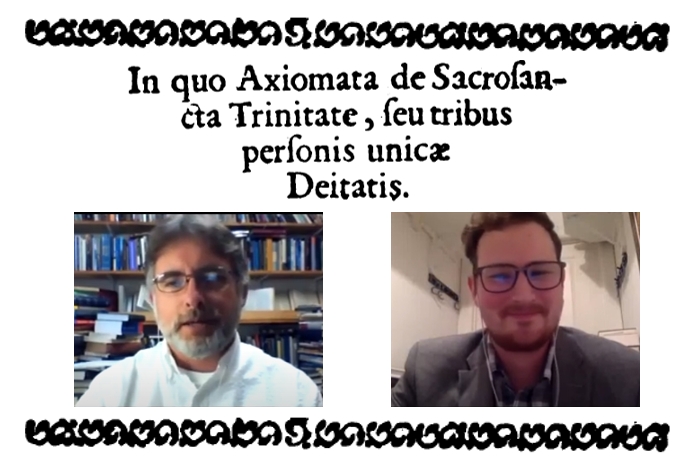
Tropos hyparxeos! Polanus comes to the point where he is ready to teach about the distinction of the persons from each other, and he invokes Cyril and Aquinas as authorities in affirming that the distinction among the persons ought to be the smallest of distinctions. This smallest distinction is made by a relation, and the notion resulting from the relation can be further characterized as a tropos hyparxeos, a way of being.
Although the formula tropos hyparxeos has a secure place in the tradition of trinitarian theology –East and West– its popularity in actual usage has waxed and waned. In fact, I was a little surprised to find Polanus employing it here, because on some accounts of the history of theology, it’s not what you’d expect from the Protestant Scholastics. But it fits well, and for Polanus it does two things. First, to identify the difference between the persons of the Trinity as a tropos hyparxeos, a way of being, eliminates bad habits that tend toward partialism. A trinitarian person is not a third of God, but is the one God; is the one God being God in this particular way. And second, to call the distinction a tropos hyparxeos is to have something to say about the person in particular, rather than just redirecting attention away from the person to the relation. The best way I can express this is to say that when I draw three circles on the board to represent the three persons, and I want to write something inside each circle to say what each person is (rather than drawing arrows between them to show how they are related), I will write something like “paternity” or “filiality.” When I do that, I’m writing the theological notion we have of that person’s relationally constituted way of being God.
This is in some ways the densest section of Polanus’ eighteen axioms that we’ve encountered so far, and Ryan and I take it pretty slowly here. Polanus himself seems to vary his level of difficulty in this section, saying some quite difficult things and then following them up with familiar recitations of the personal terms that distinguish Father, Son and Spirit.
Here’s the world premiere of the never-before-seen translation (fanfare!):
The distinction of the divine persons is that whereby one person is differentiated from the other persons due to a specific notion. Such a distinction should be the smallest one, as Cyril of Alexandria[1] and Thomas Aquinas[2] say. The smallest distinction is by relation. For this reason, the Councils and Fathers say in various places[3] that only relation makes distinction and number in God.
The relation of divine persons is the τροπος υπαρξεως, mode of existence, that is proper and incommunicable to each person, and does not compose the person but constitutes and distinguishes him from other persons without composition. This is akin to what Basil says[4] quite intelligently: the persons of the Holy Triad are not distinguished in ουσια but in τροπος υπαρξεως. So, the relation belonging to God the Father, his γνωρισμα or notion, is paternity; that belonging to the Son, filiation or nativity; and belonging to the Holy Spirit, procession or emanation through spiration.
Flowing out of this relation, there follows the distinction of divine persons according to their origin, order, and operation.
The origin of the divine persons is the procession of one person from another. The Father, as Father, is ungenerated, the principle without principle, not from another nor from himself absolutely speaking, the fount and origin of deity. For this reason, one says he is God καθ ???, under the concept of origin. The Son, as Son, is from another—i.e., from the Father by whom he is begotten, and his essential image, and essential Word. The Holy Spirit, as Spirit, is likewise form another—i.e. from Father and Son. Therefore, the Son, in the arising or origin of his person, is not from himself but from the Father, whose Son he is; the Holy Spirit likewise, in the arising or origin of his person, is not from himself, but from Father and Son, whose Spirit he is.
__________________________
[1] Cyril of Alexandria, De Trinitate, book 1.
[2] Thomas Aquinas, ST I:40, art. 2, ad. 3.
[3] Sure would be nice to have a footnote here.
[4] Basil, Against Eunomius, Book IV.
And here’s the video:
Show Notes:
We just couldn’t read this li’l Greek squib: Kath’ h@oirokhio? If you can read this, or know what it ought to say based on the context, or have a rhema moment of revelation, please give us a word of interpretation:

I also tried to track down tropos hyparxeos in the Cappadocians, and it’s a little hard to locate in most translations. Basil uses it in the widely available On the Holy Spirit 46 (though the St. Vlad translation renders it “the ineffability of God’s existence.” The key quote from his Against Eunomius shows up in several histories of doctrine: “Unbegotten is not a name indicative of the being of God, but only of a mode of existence.” This is of course the bit that Polanus quotes with approval: “The persons of the Holy Triad are not distinguished in ουσια but in τροπος υπαρξεως.” I suspect this line from Basil made its way into some doctrinal florilegia and was widely propagated as a hit single.